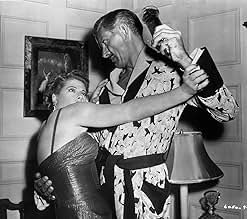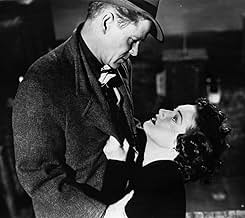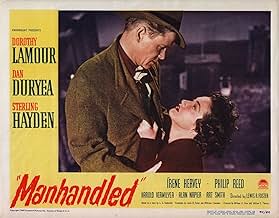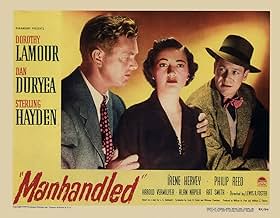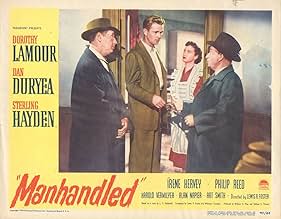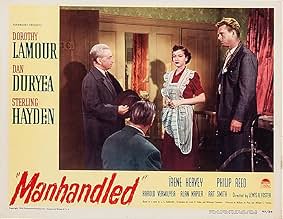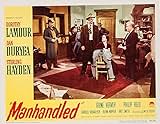अपनी भाषा में प्लॉट जोड़ेंThe secretary to a psychiatrist finds herself caught up in the murder of a patient's wife and realizes that her life is also in danger.The secretary to a psychiatrist finds herself caught up in the murder of a patient's wife and realizes that her life is also in danger.The secretary to a psychiatrist finds herself caught up in the murder of a patient's wife and realizes that her life is also in danger.
- निर्देशक
- लेखक
- स्टार
Benny Baker
- Boyd, Man in Apartment House Lobby with Girl
- (बिना क्रेडिट के)
Stanley Blystone
- Cop
- (बिना क्रेडिट के)
Paul E. Burns
- Pawn Shop Owner
- (बिना क्रेडिट के)
James Edwards
- Henry, Bennet's Butler
- (बिना क्रेडिट के)
Morgan Farley
- Doc, Police Lab Man
- (बिना क्रेडिट के)
John George
- Newspaper Vendor
- (बिना क्रेडिट के)
George Humbert
- Italian Restaurant Owner
- (बिना क्रेडिट के)
Ray Hyke
- Detective Phil Wilson
- (बिना क्रेडिट के)
Donald Kerr
- Reporter
- (बिना क्रेडिट के)
फ़ीचर्ड समीक्षाएं
The shot of an ecstatic Duryea running down a terrified Vermilyea in the narrow, darkened alley way is a great slice of noir. Too bad the tension comes so late because, despite the promising title and noir icon Duryea, the narrative holds together about as well as an O J Simpson alibi. Looks like three different scriptwriters came up with three different results, so you may need a chart to track all the threads meandering through the plot. What the screenplay lacks is focus. There really is no central character holding developments together. Hayden's the headliner, yet his role as insurance investigator remains oddly inessential. Instead, lowly Art Smith gets the law-and-order screen time and in fact most of the movie time. Now, I like actor Smith as much as the next guy, especially in sly roles (Ride the Pink Horse {1947}); still, his comic relief here is not only misplaced, but too often sounds like it's being done by the numbers. (And whoever is it that thought a cop car without brakes is funny!)
On a more positive note, Alan Napier gets a delicious turn as the snooty novelist husband, but unfortunately soon drops out of sight, and I'm really sorry Irene Hervey's sexy wife bites the dust early on. She's a lively and interesting presence, making her spats with Napier a movie high point. And that's another source of trouble. Everyone disappears from the narrative for significant periods, such that a nudge is sometimes needed to remember who they are, even the largely wasted Lamour. All this might be okay if the plot or direction generated some suspense, but they don't, at least in my little book. In fact, if it weren't for the great Duryea doing another of his patented oily operator roles, the movie would be much more forgettable than it already is. From the title, I certainly expected better.
On a more positive note, Alan Napier gets a delicious turn as the snooty novelist husband, but unfortunately soon drops out of sight, and I'm really sorry Irene Hervey's sexy wife bites the dust early on. She's a lively and interesting presence, making her spats with Napier a movie high point. And that's another source of trouble. Everyone disappears from the narrative for significant periods, such that a nudge is sometimes needed to remember who they are, even the largely wasted Lamour. All this might be okay if the plot or direction generated some suspense, but they don't, at least in my little book. In fact, if it weren't for the great Duryea doing another of his patented oily operator roles, the movie would be much more forgettable than it already is. From the title, I certainly expected better.
A woman gets murdered and her jewels are missing... with a heaping handful of likely suspects, the cops and the insurance investigator have their work cut out for them. The crackerjack script is skillful at doling out information in a series of intriguing twists and turns, with a lot of clever details. It's also laced with some humor, some of it doesn't work but a lot of it does. Dan Duryea does what he does best as the sleazy parasite of a private dick, Sterling Hayden plays it a little shabbier than usual as the insurance man, and Art Smith has an enjoyable turn as the homicide detective. Dorothy Lamour falls a little short but it's not a very meaty role. There's a lot of nice little bits of business and a cynical, seedy edge that occasionally cuts through the more light-hearted nature of the film. A fun little movie.
Really loved the idea for the story, and 'Manhandled' is exactly my kind of film as a fan of crime, mystery and thriller in all media. Sterling Hayden was always watchable when he was in good roles. Likewise with Dorothy Lamour. It was interesting too seeing a pre-Alfred (from 'Batman') Alan Napier. Other than the story and my love for the genres, my main reason for seeing 'Manhandled' was for Dan Duryea in a role he could play at the back of his hand with no problem.
'Manhandled', after watching it, is worth a look. If you love Duryea and in the type of role he plays here, you won't be disappointed. If one wants a story that consistently grabs the attention and is consistently easy to follow, dependent on personal tastes 'Manhandled' may underwhelm, like it did with me. Is it a bad film? Of course not. There is plenty going for it and it is above average. It just had a lot of potential to be great.
Beginning with the good things, 'Manhandled' is shot and designed with a gritty and classy atmosphere that never lets up. It's a very good looking film without looking too clean or unneccessarily lavish. The music is suitably ominous when used. The script is generally tight and intriguing.
There is some nice tension in the storytelling, especially towards the end when things do become exciting, and did like that the atmosphere was uncompromising and had a seediness about it at times. Napier is a delight in his role and Art Smith is amusing in his. Hayden does quite well and in command with what he is given to work with and his character is not very well fleshed out. Stealing the film is a genuinely sinister Duryea, his face alone unsettles you.
Lamour is a lot less good however in my view. Her role is practically a nothing cipher and Lamour is very bland in it. The direction is competent enough if undistinguished and could have generated a lot more tension and crispness, some of the middle felt on the pedestrian side.
Although the story has moments, it tended to be too convoluted as a result of too much going on and too many characters. The flashbacks do intrigue in parts but generally slow the pace down and further confuses the story rather than making it clearer.
Concluding, above average but not much more. 6/10
'Manhandled', after watching it, is worth a look. If you love Duryea and in the type of role he plays here, you won't be disappointed. If one wants a story that consistently grabs the attention and is consistently easy to follow, dependent on personal tastes 'Manhandled' may underwhelm, like it did with me. Is it a bad film? Of course not. There is plenty going for it and it is above average. It just had a lot of potential to be great.
Beginning with the good things, 'Manhandled' is shot and designed with a gritty and classy atmosphere that never lets up. It's a very good looking film without looking too clean or unneccessarily lavish. The music is suitably ominous when used. The script is generally tight and intriguing.
There is some nice tension in the storytelling, especially towards the end when things do become exciting, and did like that the atmosphere was uncompromising and had a seediness about it at times. Napier is a delight in his role and Art Smith is amusing in his. Hayden does quite well and in command with what he is given to work with and his character is not very well fleshed out. Stealing the film is a genuinely sinister Duryea, his face alone unsettles you.
Lamour is a lot less good however in my view. Her role is practically a nothing cipher and Lamour is very bland in it. The direction is competent enough if undistinguished and could have generated a lot more tension and crispness, some of the middle felt on the pedestrian side.
Although the story has moments, it tended to be too convoluted as a result of too much going on and too many characters. The flashbacks do intrigue in parts but generally slow the pace down and further confuses the story rather than making it clearer.
Concluding, above average but not much more. 6/10
Manhandled is directed by Lewis R. Foster and adapted to screenplay by Foster and Whitman Chambers from the novel "The Man Who Stole A Dream" written by L. S. Goldsmith. It stars Dorothy Lamour, Dan Duryea, Sterling Hayden, Irene Hervey and Art Smith. Music is by Darrell Calker and cinematography by Ernest Laszlo.
I'm going to kill you, Ruth. I have to.
Manhandled is one of those late 40s crime mysteries that feature film noir legends and film noir narrative tints, thus why it finds itself under the film noir banner. This is more a curse than a blessing. For it's not a particularly great film, where the presence of Hayden and Duryea - and Laszlo on photography - just about keeps things bubbling away to make it watchable till the end. It has been said that the narrative is too tricksy for its own good, yet that isn't apparent since the story is very easy to follow. The twists come and go at regular intervals, but always with narrative clarity.
The main thrust of the plot finds Lamour being set up as the killer of Mrs. Alton Bennet (Hervey), with Bennet's jewels the reason for the crime. But there are a few other candidates in the frame, all of which are written to be believable suspects. The cops investigating are waspish of tongue, with Smith as dry as the Sahara, and Hayden is playing an insurance investigator who is along for the ride doing exactly the same job that the coppers are doing!
Duryea is the star attraction, playing a homme fatale type who chews gum a lot, calls his girlfriend Kitten and clearly is as untrustworthy as it gets (classic Duryea portrayal really!). Hayden doesn't show up until half an hour in, but he's a welcome arrival even if he isn't given much to get his teeth into. While Lamour pouts and ponders whilst gaining sympathy, which ultimately makes us wish she had of done more film noir type films.
There's some nice metaphorical touches, such as Duryea encamped in his apartment watching a vermin species consistently running on its wheel, and Laszlo's photography goes up a notch in the latter half of film - Lamour's apartment becomes foreboding and all the hall staircase sequences take on a greater oppressive meaning. A dream sequence is chilling, and there's one particular violent scene that is unforgettable. Unfortunately some of the comedy, whilst funny at times (drugs scenes are chucklesome), takes the pic out of its dramatic comfort zone.
Hayden and Duryea fans are safe in the knowledge that this is one to see, but it still winds up as a wasted opportunity to be something far more tougher and poignant. 6/10
I'm going to kill you, Ruth. I have to.
Manhandled is one of those late 40s crime mysteries that feature film noir legends and film noir narrative tints, thus why it finds itself under the film noir banner. This is more a curse than a blessing. For it's not a particularly great film, where the presence of Hayden and Duryea - and Laszlo on photography - just about keeps things bubbling away to make it watchable till the end. It has been said that the narrative is too tricksy for its own good, yet that isn't apparent since the story is very easy to follow. The twists come and go at regular intervals, but always with narrative clarity.
The main thrust of the plot finds Lamour being set up as the killer of Mrs. Alton Bennet (Hervey), with Bennet's jewels the reason for the crime. But there are a few other candidates in the frame, all of which are written to be believable suspects. The cops investigating are waspish of tongue, with Smith as dry as the Sahara, and Hayden is playing an insurance investigator who is along for the ride doing exactly the same job that the coppers are doing!
Duryea is the star attraction, playing a homme fatale type who chews gum a lot, calls his girlfriend Kitten and clearly is as untrustworthy as it gets (classic Duryea portrayal really!). Hayden doesn't show up until half an hour in, but he's a welcome arrival even if he isn't given much to get his teeth into. While Lamour pouts and ponders whilst gaining sympathy, which ultimately makes us wish she had of done more film noir type films.
There's some nice metaphorical touches, such as Duryea encamped in his apartment watching a vermin species consistently running on its wheel, and Laszlo's photography goes up a notch in the latter half of film - Lamour's apartment becomes foreboding and all the hall staircase sequences take on a greater oppressive meaning. A dream sequence is chilling, and there's one particular violent scene that is unforgettable. Unfortunately some of the comedy, whilst funny at times (drugs scenes are chucklesome), takes the pic out of its dramatic comfort zone.
Hayden and Duryea fans are safe in the knowledge that this is one to see, but it still winds up as a wasted opportunity to be something far more tougher and poignant. 6/10
"Manhandled" is a decent 1949 film with a terrific cast that could have been really excellent. Unfortunately, it suffers from a lack of focus from director Lewis Foster.
Dorothy Lamour plays the secretary to a psychiatrist (Harold Vermilyea) who is treating an author (Alan Napier). The man has a recurring dream that he kills his wife (Irene Hervey) with a large perfume bottle. The doctor thinks he needs money and might be after his wife's jewels, worth somewhere in the range of $100,000.
Lamour, whose character's name is Merl Kramer, tells a detective in her apartment building (Dan Duryea) about the strange case. Any of us who have ever seen Dan Duryea in a film know that this is a mistake on her part.
As could have been predicted, the wife of the author winds up dead, the jewels stolen, and one of the pieces winds up in Merl's couch. She pawns it and finds herself in deep trouble.
As you might be able to tell from the above description, the director isn't the only problem here. The script doesn't hold up to the most casual of scrutiny.
Granted Merl doesn't tell the Duryea character the name of her boss' client, but she certainly would know what goes on in the office is confidential. The big perfume bottle as the murder weapon is pretty lame.
The worst aspect for me is the diagnosis of the psychiatrist. A man and his wife are living under the same roof, but they're estranged. She's seeing somebody else, in fact, and the psychiatrist comes to the conclusion that the author wants his wife's jewels. That's some stretch.
It's always sad to see what happened to some of the glamorous female film stars - Lamour here is all of 34 and relegated to smaller films. Her character has a mysterious past which we never really learn about, another script hole.
Sterling Hayden plays an insurance investigator and does a good job. Art Smith is the police detective and very funny.
Kind of a mish-mash, and a convoluted plot that could have emerged as a neat twist in other hands, but some good scenes nonetheless.
Dorothy Lamour plays the secretary to a psychiatrist (Harold Vermilyea) who is treating an author (Alan Napier). The man has a recurring dream that he kills his wife (Irene Hervey) with a large perfume bottle. The doctor thinks he needs money and might be after his wife's jewels, worth somewhere in the range of $100,000.
Lamour, whose character's name is Merl Kramer, tells a detective in her apartment building (Dan Duryea) about the strange case. Any of us who have ever seen Dan Duryea in a film know that this is a mistake on her part.
As could have been predicted, the wife of the author winds up dead, the jewels stolen, and one of the pieces winds up in Merl's couch. She pawns it and finds herself in deep trouble.
As you might be able to tell from the above description, the director isn't the only problem here. The script doesn't hold up to the most casual of scrutiny.
Granted Merl doesn't tell the Duryea character the name of her boss' client, but she certainly would know what goes on in the office is confidential. The big perfume bottle as the murder weapon is pretty lame.
The worst aspect for me is the diagnosis of the psychiatrist. A man and his wife are living under the same roof, but they're estranged. She's seeing somebody else, in fact, and the psychiatrist comes to the conclusion that the author wants his wife's jewels. That's some stretch.
It's always sad to see what happened to some of the glamorous female film stars - Lamour here is all of 34 and relegated to smaller films. Her character has a mysterious past which we never really learn about, another script hole.
Sterling Hayden plays an insurance investigator and does a good job. Art Smith is the police detective and very funny.
Kind of a mish-mash, and a convoluted plot that could have emerged as a neat twist in other hands, but some good scenes nonetheless.
क्या आपको पता है
- ट्रिवियाStar Dorothy Lamour, in her autobiography, described working with George Reeves in the role of "an extremely sinister cad," despite the fact that he is nowhere to be seen in the film and no studio or trade references confirm his participation.
- गूफ़The police would never have allowed a private detective to search a suspect's room unaccompanied because of the risk of evidence being planted, which is exactly what happened. Similarly they would not have tolerated interference by an insurance investigator.
- भाव
Detective Lt. Bill Dawson: I've never known a congenital wise-guy yet that didn't outsmart himself.
- कनेक्शनReferenced in Remington Steele: Cast in Steele (1984)
टॉप पसंद
रेटिंग देने के लिए साइन-इन करें और वैयक्तिकृत सुझावों के लिए वॉचलिस्ट करें
- How long is Manhandled?Alexa द्वारा संचालित
विवरण
- रिलीज़ की तारीख़
- कंट्री ऑफ़ ओरिजिन
- भाषा
- इस रूप में भी जाना जाता है
- A Man Who Stole a Dream
- फ़िल्माने की जगहें
- उत्पादन कंपनी
- IMDbPro पर और कंपनी क्रेडिट देखें
- चलने की अवधि1 घंटा 37 मिनट
- रंग
- पक्ष अनुपात
- 1.37 : 1
इस पेज में योगदान दें
किसी बदलाव का सुझाव दें या अनुपलब्ध कॉन्टेंट जोड़ें


